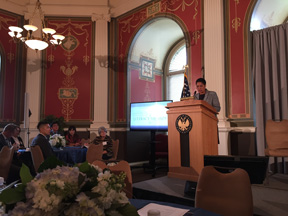Literacy and Reading Section: Call for Proposals
Theme: Literacy Matters: It takes a community to raise a reader – building a nation of readers and creating a reading culture.
This session is cosponsored by the IFLA Literacy and Reading Section in partnership with the Children’s and Young Adults Section, the Public Libraries Section and the School Libraries Section
Literacy has long been identified as a precursor to success in academic achievement and the workplace. Literacy problems have been directly linked to healthcare issues, workplace safety, equity and access to work, negative drag on the overall GDP per capita of a country. The correlation between poverty and literacy is well documented and society rewards individuals who have higher literacy levels, not explicitly, but it’s inherent in the system.
Libraries have always been based on equity and access to information. They are public spaces where both newcomers and native citizens have opportunities to gain literacy skills, forge community and national identity, develop and maintain reading and literacy skills to gain access to knowledge and skills. Libraries have a key role in helping citizens to develop a reading culture and to support building a nation of readers.
Topics of Interest
Papers chosen for presentation will examine how libraries support literacy and the development of a reading culture. Proposals should be grounded in theory, research and/or practical applications. Key areas include:
· Library reading projects and initiatives with children, young people, adults or organisations that demonstrate best practice in supporting literacy development within communities and help to build and strengthen a reading culture.
· Partnerships – exploring what the roles are of different members in a community (e.g., parents, schools, businesses, employers and young people themselves) and how partners can work together with libraries to create a reading culture.
· Advocacy – outlining the importance of literacy at the global and the local level, how to advocate for it and measure the impact of the advocacy work.
· Research – that demonstrates the impact of libraries in building reading nations, what does the research tell us and the effective use of this information in practical applications.
· Digital – examples of how digital tools have been used to help librarians promote literacy and develop a reading culture.
Successful proposals will be expected to write a paper and prepare a presentation for delivery in Wroclaw, Poland. Best Practice initiatives will also be asked to produce a short video of their case study (guidelines will be issued for this process) for inclusion in the Literacy Matters! and / or the Children’s & Young Adults You tube channel currently being developed.
Submission: Friday 17th February
Please email any queries and your proposal to: Barbara Combes, bcombes@csu.edu.au
For more information please visit: http://2017.ifla.org/cfp-calls/literacy-and-reading-with-children-young-adults-public-school-libraries
